Fantasia Diary 2015, Day 7: International Science-Fiction Short Film Showcase 2015, and Meathead Goes Hog Wild
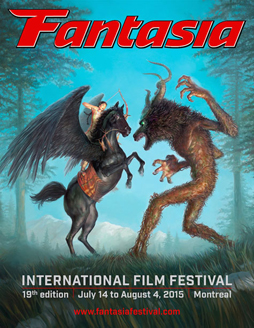 Monday, July 20, was a relatively short day for me at the Fantasia Festival, but one I was looking forward to with great curiosity. At 5 PM I was going to the De Sève Theatre to watch a collection of science-fictional short films: Fantasia’s International Science-Fiction Short Film Showcase 2015 (to give the screening its official name) would show nine films ranging from four to twenty minutes long from seven different countries. Afterwards I’d stick around to see the world premiere of Meathead Goes Hog Wild, a Chicago-set movie about a man pushed to the edge of sanity. It ended up an interesting mixed bag. To go through everything I saw in order:
Monday, July 20, was a relatively short day for me at the Fantasia Festival, but one I was looking forward to with great curiosity. At 5 PM I was going to the De Sève Theatre to watch a collection of science-fictional short films: Fantasia’s International Science-Fiction Short Film Showcase 2015 (to give the screening its official name) would show nine films ranging from four to twenty minutes long from seven different countries. Afterwards I’d stick around to see the world premiere of Meathead Goes Hog Wild, a Chicago-set movie about a man pushed to the edge of sanity. It ended up an interesting mixed bag. To go through everything I saw in order:
“Welcome to Forever,” an American short written and directed by Laddie Ervin, clocks in at 13 minutes and opens with a newscast setting up a future in which minds can be uploaded into the cloud and then downloaded into robot bodies. We learn that 112 million people have taken advantage of this technology, sparking protests — and then also learn that a nasty virus has struck at the cloud consciousnesses. The film then focusses in on a small-scale story of a man (Clive Hawkins) trying to clean up one of the many loose ends the virus left.
It’s effective enough, but doesn’t entirely come together; the introductory section and the main story feel disconnected. And the setting’s much larger than the story, so the themes of the main dramatic action are out of sync with the science-fictional elements. The world’s too big, the questions raised by the uploading technology too varied. And while the film looks sharp, the characters don’t feel real. Oddly, the film’s own success at sketching the setting undermines it: the world feels so interesting I want a story that explores it more deeply. As it is, the movie’s an interesting piece, but I don’t think it’s a total success.
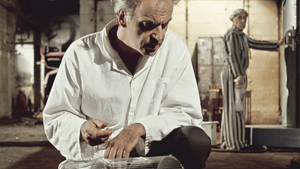 “The Rat’s Dilemma,” an Israeli film written and directed by Naor Meningher, is about a Jewish scientist (Mendy Cahan) in a Nazi camp trying to build a working teleporter. He can’t quite seem to get it right, and the Nazi officer overseeing the experiment (Sassi Keshet) comes up with a brutal way to motivate him. The film’s conclusion makes clear the scientist’s choice and what price he decided to pay.
“The Rat’s Dilemma,” an Israeli film written and directed by Naor Meningher, is about a Jewish scientist (Mendy Cahan) in a Nazi camp trying to build a working teleporter. He can’t quite seem to get it right, and the Nazi officer overseeing the experiment (Sassi Keshet) comes up with a brutal way to motivate him. The film’s conclusion makes clear the scientist’s choice and what price he decided to pay.
It’s an excellent film, setting up a lot of ideas and images and then tying them all together in ten minutes of running time. It’s shot on a budget, but the cinematography’s excellent and atmospheric. The acting’s strong, and the structure of the film is perfect, building to the final shot that acts as the capstone of an arch.
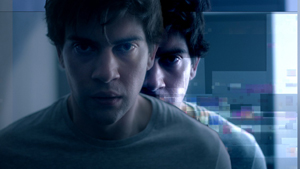 “Legacy” comes from Australia’s Josh Mawer, who came up with the story, co-wrote the script with Michael Richardson, and directed the thirteen-minute-long film. Edward, the adult son of a dead scientist, agrees to have an implant placed in his brain that will allow his father’s consciousness to use his body and carry on his groundbreaking work. But his father’s whole personality survives, physically possessing Edward, and when Edward awakens after periods of unconsciousness he soon finds disturbing things have been done by his body. How will he balance his shock and disgust against his loyalty to his father?
“Legacy” comes from Australia’s Josh Mawer, who came up with the story, co-wrote the script with Michael Richardson, and directed the thirteen-minute-long film. Edward, the adult son of a dead scientist, agrees to have an implant placed in his brain that will allow his father’s consciousness to use his body and carry on his groundbreaking work. But his father’s whole personality survives, physically possessing Edward, and when Edward awakens after periods of unconsciousness he soon finds disturbing things have been done by his body. How will he balance his shock and disgust against his loyalty to his father?
The film works because while you can see problems coming, and guess at what Edward’s father will end up doing with his son’s body, you’re still carried along by the story. Partly that’s because Mawer keeps things moving and structures the film effectively. And partly that’s because Drew Wilson, as Edward, is a strong actor who plays the two personalities well, and sympathetically conveys a wide emotional range — concern, fear, love, submission, exasperation, betrayal, it’s all a lot to go through in under a quarter of an hour. I do think the film ends too early, before the consequences of Edward’s final choice are fully explored, but then on the other hand it does build nicely to the concluding moment.
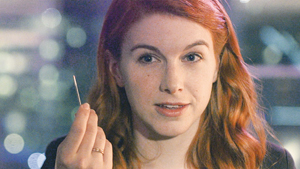 “Shut-in” is a 14-minute film from the UK, written (I think; it’s hard to find credits for it online) and directed by David Franklin. As the film opens a journalist named Amy (Aislinn De’Ath) is interviewing a man named Akira (Alex Francis) in a simulacrum of London. It’s all a long-running VR world, we learn, and Akira’s been living in it for years, ever since some sort of crime in his past. Slowly we learn about that crime, and how it’s brought Amy to interview him.
“Shut-in” is a 14-minute film from the UK, written (I think; it’s hard to find credits for it online) and directed by David Franklin. As the film opens a journalist named Amy (Aislinn De’Ath) is interviewing a man named Akira (Alex Francis) in a simulacrum of London. It’s all a long-running VR world, we learn, and Akira’s been living in it for years, ever since some sort of crime in his past. Slowly we learn about that crime, and how it’s brought Amy to interview him.
It’s a nicely-performed piece, particularly on the part of De’Ath. Unfortunately, the story logic seems to fall down at the end. There’s a scheme involved which comes off as over-elaborate. People do things that, when all becomes clear, feel in retrospect as though they were designed to set up exposition for the audience. You understand why the characters are doing what they’re doing; but the way they go about it doesn’t follow logically. It’s a shame, because the dialogue’s fine and the dramatic tension grows up until the final revelations.
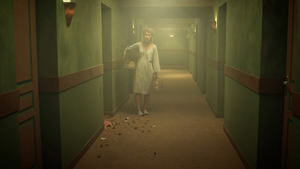 “Maxiplace,” is 20-minute satire of income inequality directed by France’s Vincent Diderot from a script by Diderot and Leila Deroux. In the future, the wealthy are able to buy living space from the poor: apartments reconfigure themselves according to the wishes of those who can pay for square footage. We follow a rich man, Leduc, who aggrandizes his home at his neighbours’ expense, as they take up living in tents in the hall. He takes in one of them, a beautiful young woman named Clara — but one of the underprivileged men, Alain, also desires Clara.
“Maxiplace,” is 20-minute satire of income inequality directed by France’s Vincent Diderot from a script by Diderot and Leila Deroux. In the future, the wealthy are able to buy living space from the poor: apartments reconfigure themselves according to the wishes of those who can pay for square footage. We follow a rich man, Leduc, who aggrandizes his home at his neighbours’ expense, as they take up living in tents in the hall. He takes in one of them, a beautiful young woman named Clara — but one of the underprivileged men, Alain, also desires Clara.
It’s very Gilliamesque conceit, giving the satire more weight than story logic. One might wonder weather the wealthy would really accept having the poor so close to their homes. But go with the premise, and the film works well. The jokes are well-timed and funny, and the increasingly unequal community is sketched in nicely. The basic idea’s taken to some interesting places, as the rich (Leduc) get richer and the poor get increasingly shafted.
 American writer-director Trinity Shi’s “Time Capsule” does an awful lot in four minutes — the title almost serves as a description. Difficult not to over-explain the plot for a piece so short, so: there’s a female astronaut in trouble (Kyla Garcia), who swiftly realises the nature of her predicament and has to make a choice. The film moves quickly, does what it does, and ends. I wish it was a bit more surprising, but it gets across a brief tale about inspiration and sacrifice.
American writer-director Trinity Shi’s “Time Capsule” does an awful lot in four minutes — the title almost serves as a description. Difficult not to over-explain the plot for a piece so short, so: there’s a female astronaut in trouble (Kyla Garcia), who swiftly realises the nature of her predicament and has to make a choice. The film moves quickly, does what it does, and ends. I wish it was a bit more surprising, but it gets across a brief tale about inspiration and sacrifice.
“The Future Perfect” is an American film, a twelve-minute-long piece written and directed by Nick Citton. It stars Robert Baker as Hardesty, a man whose job is to travel back in time and fix injustices, even though what he has to do may be a lesser injustice of its own. Zachary Quinto is the voice of the unseeen Greenwood, the man who gives Hardesty his orders. When a particularly tough job comes along, Hardesty balks — but there’s more going on here than it appears, and his choice will have direct personal consequences for both himself and Greenwood.
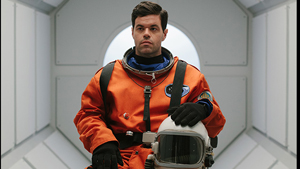 It’s an effective piece that balances determinism and free will, and questions whether knowledge of the consequences of our actions will make those actions easier or not. There is a logic issue — the difficult choice Hardesty’s forced to make seems unneeded, since the particular problem his action might solve could apparently be solved any number of other ways. It’s perhaps possible to argue that time travel’s shown those ways are in the long term unworkable, but a line addressing that would have been nice. Still, the movie does some unexpected things, and notably discusses chronic illness with a powerful and well-written monologue.
It’s an effective piece that balances determinism and free will, and questions whether knowledge of the consequences of our actions will make those actions easier or not. There is a logic issue — the difficult choice Hardesty’s forced to make seems unneeded, since the particular problem his action might solve could apparently be solved any number of other ways. It’s perhaps possible to argue that time travel’s shown those ways are in the long term unworkable, but a line addressing that would have been nice. Still, the movie does some unexpected things, and notably discusses chronic illness with a powerful and well-written monologue.
The 15-minute “ReStart,” by Spanish writer-director Olga Osorio, follows a woman (Marta Larralde) named Andrea, kidnapped by mysterious forces and placed into a time loop. We follow her attempts to break free — to find a way out of the loop by preventing her own kidnapping. Can she remake her own past?
 It’s a taut, thriller-like story. It’s also aware of genre precedents — you can spot a Spanish copy of Asimov’s The End of Eternity. It’s very well-acted by Larralde, and doesn’t go where you’d expect. The resolution’s ambiguous, but I think points to the value of even a small change (and what that change might mean). It’s a spare, intelligent piece that brings out character with a minimum of dialogue.
It’s a taut, thriller-like story. It’s also aware of genre precedents — you can spot a Spanish copy of Asimov’s The End of Eternity. It’s very well-acted by Larralde, and doesn’t go where you’d expect. The resolution’s ambiguous, but I think points to the value of even a small change (and what that change might mean). It’s a spare, intelligent piece that brings out character with a minimum of dialogue.
“Dark Was the Night,” from the UK, is an 18-minute piece directed by Sam McMullen from a story by McMullen and Chris Cornwell, with the script written by Cornwell. A girl named Vik (Daisy Waterstone) is in what appears to be a spaceship, isolated by a clear partition from her father Wyatt (Daniel O’Meara), with her mother (Zara Plessard) missing following a hull breach. Wyatt urges Vik to forget her mother and move forward — but then late at night Vik’s radio begins to pick up her mother’s voice. Things get stranger, and we quickly realise all is not as it appears.
 The resolution’s not a great surprise, but the story’s well-told. The tension that develops between Vik and Wyatt carries the film, and Waterstone’s acting brings out Vik’s confusion and emerging sense of betrayal. When she chooses to disobey Wyatt and go look for her mother there’s a sense of real drama and momentousness. The pacing’s slow, but on the whole this heightens the conflict and mystery. It’s a solid execution of a good genre story.
The resolution’s not a great surprise, but the story’s well-told. The tension that develops between Vik and Wyatt carries the film, and Waterstone’s acting brings out Vik’s confusion and emerging sense of betrayal. When she chooses to disobey Wyatt and go look for her mother there’s a sense of real drama and momentousness. The pacing’s slow, but on the whole this heightens the conflict and mystery. It’s a solid execution of a good genre story.
Most of the nine movies follow that pattern, in fact. Watching them as a whole felt a lot like reading a SF anthology from about 1960. The technology and settings are more up-to-date, of course; what I mean is that the films had the feel of stories written before the New Wave really hit but after the groundwork of the genre had been laid down. A period when writers were trying new things with genre, but hadn’t yet become wildly experimental on a formal level. Having read a fair amount of science fiction, none of the stories were terribly surprising, but most of them were done with enough craft that they were worth watching.
After the SF shorts came Meathead Goes Hog Wild. Kevin Cline, Zach Harris, and Sean Pierce all share writing and directing credits. Cline stars as a young man (never named in the film) who’s the product of an affluent suburb in Chicago, now trying to make it on his own in the city. We follow him visiting his parents, working at a butcher’s shop, and getting the phone number of an attractive passerby after a near-violent encounter with another man. Then he’s fired from work, and our protagonist increasingly loses his grip: he steals a sack of meat from his work, and sets out to redistribute the meat, a symbol of virility and power, in a lower-class neighbourhood.
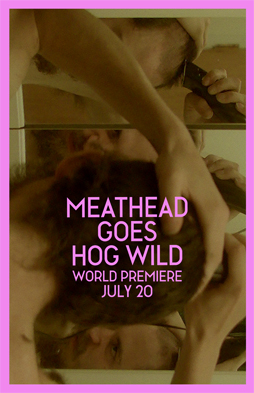 Things go from bad to worse, and it’s notable that the protagonist always brings problems on himself. He makes thoughtless decision after thoughtless decision, spiralling ever further down and affecting everyone around him. The disintegration of his mind and reason seems reflected by the loss of his shoes and possessions and clothes; he’s literally stripped down. Since the neighbourhood in which he acts out seems to be largely African-American, there’s a racial dimension here. By the end of the film he’s telling himself that he can get through things, that he can come back from the place he’s put himself; indeed he might, but given the chaos he’s caused and the violent things he’s done, that’ll clearly be a function of the social privilege he was born into.
Things go from bad to worse, and it’s notable that the protagonist always brings problems on himself. He makes thoughtless decision after thoughtless decision, spiralling ever further down and affecting everyone around him. The disintegration of his mind and reason seems reflected by the loss of his shoes and possessions and clothes; he’s literally stripped down. Since the neighbourhood in which he acts out seems to be largely African-American, there’s a racial dimension here. By the end of the film he’s telling himself that he can get through things, that he can come back from the place he’s put himself; indeed he might, but given the chaos he’s caused and the violent things he’s done, that’ll clearly be a function of the social privilege he was born into.
The movie has a striking sense of place, giving an almost psychogeographical sense of the different neighbourhoods we see, implying histories of class and race. It plays into the histories of the characters, the protagonist’s especially. We see where he was raised, and where he lives now. And how far mentally these places are from where he ends up. A drive out to the suburbs comes near the start of the film; it’s mirrored with a long walk at the end, tying place to place.
The walk did raise a practical question in my mind — given the neighbourhoods the protagonist’s walking through, and the state he’s in, how likely is it that he isn’t picked up by the police? I’m tempted to say it’s a poetic conceit, part of the dreamlike feel of the film. But that also feels like selling the movie short. Even as the protagonist’s actions grow more and more unhinged, there are specific reasons why his mind takes a further step toward disintegration: specific stresses that push him further and further. Handwaving the walk seems almost like a disservice to a film that balances comedy and darkness so effectively.
Visually, the movie’s filled with static shots, often seen from a distance. It’s tremendously effective at bringing out the comedy of the situation, as Cline’s beanpole frame and windmilling limbs are dwarfed by massive architecture. The compositions and even the stillness means that the motion of the character draws the eye: we focus on Cline, who seems almost exposed, frantic actions captured in an unmoving frame.
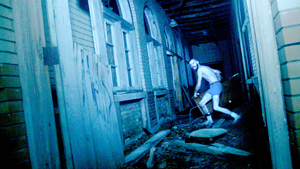 Cline generally does a good job of capturing the sheer fecklessness of his character. The film’s a sort of coming-of-age story gone horribly wrong; perhaps the story of what happens when someone old enough to be of age hasn’t found his way to maturity. The first images, under the opening credits, are of a Black bodybuilder, and the story begins with Cline’s character talking to a Black athletic trainer at a gym. Cline’s skinny White guy wants to build muscles, wants to add “size.” He wants to be strong, and the movie is in part a critique of the aspiration to strength, of the way otherness can be read as a mysterious strength, and of how a sense of inadequacy breeds fear.
Cline generally does a good job of capturing the sheer fecklessness of his character. The film’s a sort of coming-of-age story gone horribly wrong; perhaps the story of what happens when someone old enough to be of age hasn’t found his way to maturity. The first images, under the opening credits, are of a Black bodybuilder, and the story begins with Cline’s character talking to a Black athletic trainer at a gym. Cline’s skinny White guy wants to build muscles, wants to add “size.” He wants to be strong, and the movie is in part a critique of the aspiration to strength, of the way otherness can be read as a mysterious strength, and of how a sense of inadequacy breeds fear.
That sense of inadequacy sends the protagonist over the edge. Will he be able to come back from it? Perhaps; but when he acts out, other people pay the price. And some of what he does has dreadful consequences. Put it all together, and you have an excellent low-budget film that balances comedy and madness.
A question-and-answer session with the three writer-directors followed the screening. Asked how they collaborated, Cline said that the three were friends since their school days, and that all they did in high school was make movies together. Sean Pierce added that they varied their roles with each project. Asked about their reason for writing about insanity, Cline said that the time of making the movie he was not in a good mental place, and channelled that into the script. He hadn’t acted before, and they’d originally planned to cast a trained actor. Asked about the film’s editing — a particularly skilful aspect of the film — Zach Harris said that they’d begun editing at the end of August, 2014, and finished a few weeks before that night. Pierce added that anyone who makes art can relate to self-imposed deadlines.
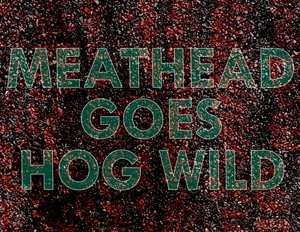 Asked about a scene with the protagonist’s family’s dog, in which the dog was said to be in a lot of pain, Cline said that he felt the scene was a metaphor for leaving childhood behind, and disillusionment with the adult world; the dog in some sense was a symbol for the bubble of suburban life. In response to the next question, Harris said that they shot almost all the movie guerilla-style. Pierce noted that interiors were the exception, and that the movie was a good experiment to see what people would let them get away with. Harris said that even the police were nice, and Pierce agreed, recalling that the police were genuinely concerned over their safety in shooting in “not-so-nice” parts of Chicago.
Asked about a scene with the protagonist’s family’s dog, in which the dog was said to be in a lot of pain, Cline said that he felt the scene was a metaphor for leaving childhood behind, and disillusionment with the adult world; the dog in some sense was a symbol for the bubble of suburban life. In response to the next question, Harris said that they shot almost all the movie guerilla-style. Pierce noted that interiors were the exception, and that the movie was a good experiment to see what people would let them get away with. Harris said that even the police were nice, and Pierce agreed, recalling that the police were genuinely concerned over their safety in shooting in “not-so-nice” parts of Chicago.
Asked about the cinematography of the film, Harris said that they wanted to create an environment, and create an observational feel. They would follow their protagonist down the rabbit hole, but not from inside his head — they wanted to take a step back. Asked about the walk near the end of the movie, Cline said it took two days to film during the limited periods when the sun was rising, and that they’d race from location to location to catch the light. Asked where they found actors for the smaller roles, Harris said though some were professional actors or friends of the filmmakers, they’d also ask people walking by. Another question brought the movie’s composer up to talk about the soundtrack (he started by working with the final scenes of the film, and went backward).
Asked about a theme in the movie of characters trying to be good, and acting according to their own moral codes, Cline spoke of trying to show the way people rationalise their actions, and how human rationality tends merely to confirm emotional reactions. The film was about rationality as a slave to the emotions. Asked what the inspiration for the movie was, Pierce said it began as a short film about “meat addiction,” and they decided to play with the idea further. Cline observed that eating meat does cause testosterone to rise, and that meat therefore suggested itself as a metaphor for masculinity. I garbled a question about the film’s sense of place, and Cline spoke about how the protagonist’s apartment at the start of the film was in a recently-gentrified area. They wanted also to show the ignorance of the suburbs, and the segregation of neighbourhoods. The media depicts certain areas as rough and dangerous, he said, but the filmmakers found the people there were quite nice.
Which ended the screening. It had been a short day at the Festival for me. I had a longer one coming up.
(You can find links to all my 2015 Fantasia diaries here.)
Matthew David Surridge is the author of “The Word of Azrael,” from Black Gate 14. His ongoing web serial is The Fell Gard Codices. You can find him on Facebook, or follow his Twitter account, Fell_Gard.
[…] Black Gate’s review during Fantasia Montreal, by Matthew Surridge […]